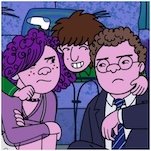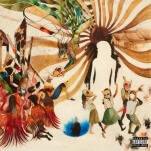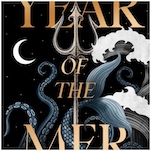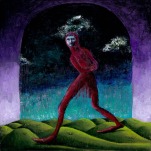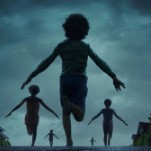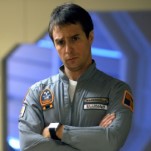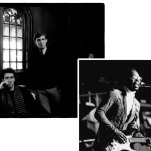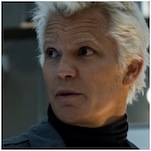Toon In: Animated TV Highlights for August, from Sausage Party: Foodtopia to Snoopy Presents: A Summer Musical
(Photo: Apple TV+)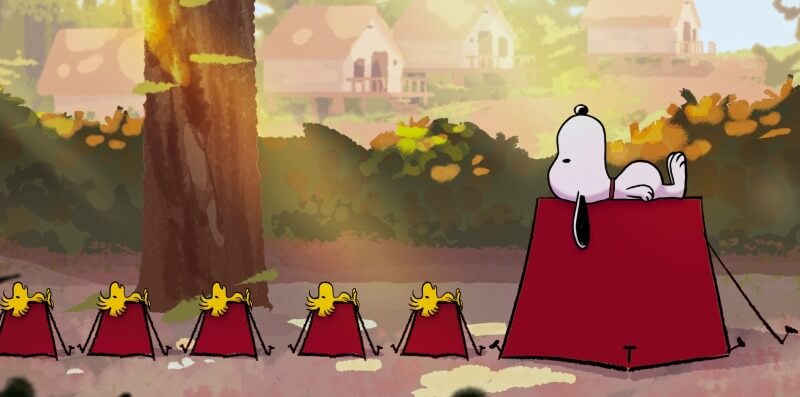
Welcome to the ink, paint, and pixel corner of Paste TV, where we’re highlighting some of the best premium animation projects on streaming or direct-to-video aimed at teens and adults. This monthly column not only provides an overview of the new animated series to check out, but we’ve also collected some of the finest creators and voice talents in the medium to give updates, or introductions, to their series.
![]()
King of the Hill Season 14 (August 4)
Since the 2009 series finale of Mike Judge and Greg Daniels’ modern, animated classic King of the Hill, it turns out that Hank (Judge) and Peggy Hill (Kathy Najimy) have been living in Saudi Arabia seeing the world outside of Arlen, Texas as a by-product of his new job. And as is the case with just about every 2000s era animated series, King of the Hill is back for a revival at its new streaming home, Hulu.
Technically the show’s 14th season, the story picks up 16-years after the finale and catches viewers up with the happenings of the Hills, including a now grown Bobby (Pamela Adlon), their weirdo neighbors, and the series reflects the changes that have permeated the United States, Texas, and little Arlen in the meantime.
Showrunner Saladin Patterson (Psych) is in charge of the day-to-day on the revival and tells Paste that he’s still amazed at his full circle position, now running the series that he once wrote his second spec script about when he was a baby writer in the Disney|ABC Writing Fellowship program back in 1997. Even funnier, Patterson says back in the day he chose a staff job on Frasier instead of King of the Hill, a fact that Daniels’ doesn’t let him live down.
Having successfully executive produced the recent ABC revival of The Wonder Years, Judge and Daniels knew he was the right person to bring King of the Hill into the 2020s, not an easy task considering how polarized the country is today. Asked how they wanted to address that, Patterson explains, “The original run of King of the Hill was certainly a show, even though it’s animated, known to be grounded and based in reality. It was also known as a show that wasn’t afraid of some sort of social commentary, in a good way. But as Greg Daniels points out, it was never a late night talk show. It was never a show that was trying to dive into politics. It was a show that tried to represent very relatable stories about Hank and his family, child-raising, and how society affects that. Sometimes you’re behind the times and sometimes you’re not, and so those are very relatable things. What it wasn’t in terms of being overly political, it was in terms of making commentary about culture and that’s what we wanted to make sure we stayed true to. Hank always represented the sensible, common sense middle, and the show would have fun satirizing people on the extremes, be it political or cultural extremes. What attracted me to this was Hank’s common sense middle, if you put it in the political spectrum, now looks like an extreme because the opposite sides have become so extreme.”
As Hank and Peggy have lived on a Middle East base meant to mimic pure Americana living, the revival puts them in the middle of U.S. cultural change that has Hank and his Texas pals feeling like the ones out of synch. “Whereas the original was about parenthood, now it’s about being empty nesters.” Patterson says. “And Peggy and Hank are at retirement age now, so what does that mean for someone like Hank who’s never not had a job? And Peggy, who has always been in her mind, the best at everything, when she’s not doing anything, what is she gonna be the best at? It’s putting those characters who are still themselves in these new situations that people can still relate to and that felt like a very good, organic mix for us to be able to do some really fun things.”
In choosing how to tell stories for this revival, Patterson says they were most guided by asking themselves, what will fans who haven’t seen these characters for 16-years want to see and experience most? “It’s serialized, I guess, by the technical definition of the term,” he says of how the season flows. “We certainly have some mini arcs, but there’s still some standalone episodes that could land anywhere in the season that are just fun. I think we still stay close to what the DNA of the original show was.”
As a Black showrunner who also has a lived experience, Patterson says he heard from the start complaints about the series “going woke” with him in charge but he says the show is a reflection of all of the writer’s lived experiences including his personal fondness for boar hunting, or baseball. “But at the same time, I am very happy that there is an episode in this season where Black barbershop Peggy may be making an appearance that I think is going to be very fun, to see our characters in an environment you may not have seen them in before,” he teases.
![]()
The Proud Family: Louder and Prouder Season 3 (August 6)
Another revival hit remains The Proud Family: Louder and Prouder, which has found an ardent fanbase on Disney+.
Its third season (with the fourth already ordered) debuts this month and continues the adventures of Penny Proud (Kyla Pratt) and her memorable family: parents Oscar and Trudy, twin siblings BeBe and CeCe, and grandmother Suga Mama. Also a musical, the season features original songs by Kurt Farquhar and songwriter and producer, Roccstar.
![]()
Sausage Party: Foodtopia Season 2 (August 13)
Is it a coincidence that two of the hardest R-rated animated titles of the year drop on the same day? Be warned, Fixed and the second season of Prime Video’s Sausage Party: Foodtopia are going to make you blush and laugh a lot…just keep the kiddies away from both. In the case of the latter, executive producers Ariel Shaffir and Kyle Hunter continue the story they established in the 2016 film, Sausage Party. And like the film, the series features a voice cast so great it reads like a prank. In the sophomore season, they even got Marion Cotillard to voice a Dijon mustard jar and they feature one of the last voice performances by Andre Braugher.
When last we left our sentient food, Frank (Seth Rogen) the sausage made himself the leader of Foodtopia for the “best” of everyone and that has not sat well with just about everyone but his close pals Sammy (Ed Norton) the neurotic bagel and Barry (Michael Cera) the runt sausage.
Shaffir tells Paste that coming out of the first season, they recognized their story was too contained to a small mall area across the street from the grocery store, so they went more ambitious for the second season. “We wanted to open up the world a lot more and explore beyond that area,” he says of Frank’s eventual move to New Foodland. “A guiding principle for the season was to make it a little more adventurous and exploratory as part of Frank’s arc is about learning how to cede control. He goes through a pretty great journey this season. He’s in search of this perfect utopian society, and through the course of the season, he believes that he may have found it.”
As for their incredible cast, anchored by Rogen, Norton and Cera, Shaffir says even they are shocked by the talent the show has attracted. “In some situations, like with Jillian Bell who plays a major character a season, we worked with her on the Christmas movie, The Night Before so that was an easy ask. But for Marion Cotillard, no one had, at least to my knowledge, worked with her before,” he explains. “We had this French character and that was absolutely a wish list, like, ‘Why don’t we take a shot at Marion?’ Our casting director just reached out and she was available and said yes, so we were so psyched!”
As always, Foodtopia is crammed with dirty jokes in all forms, but there’s also some poignant moments scattered throughout as Frank evolves as a misbegotten meat. Shaffir says they upped their writing game and they’re really really proud of the season. “It’s a major improvement on even season one, which we liked as well. I actually, legitimately, really, really love every episode. We’ve made many seasons of television and there’s always a few episodes that stick out, like, ‘I wish that was better.’ But this season, I think they’re all really good. And I really love episode six and the finale is huge. It’s by far, the most ambitious episode we made of the show. I’m shocked that we were able to pull it off. But we had a great team, so it’s a real testament to everyone that worked in the show that we were able to pull off such a huge episode.”
![]()
Fixed (August 13)
Fixed, writer/director Genndy Tartakovsky’s (Primal) long-gestating adult 2D animated feature about an average mutt having a last night out on the town with his dog pals before he’s neutered, had been in distribution limbo since 2023. And then Netflix added it to its 2025 slate of releases, so the world will get to see what Tartakovsky does when unfettered by the constraints of family fare rules.
Check out our new interview with him this month in Paste Movies.
![]()
Snoopy Presents: A Summer Musical (August 15)
It’s been five years since Charles Schulz’s Peanuts transitioned into their Apple TV+ era which now features several original animated series and seven animated specials under the Snoopy Presents banner. The latest is Snoopy Presents: A Summer Musical written by Charles’ son Craig Schulz, his grandson Bryan Schulz, and Cornelius Uliano (The Peanuts Movie) and directed by animator Erik Weise (Sonic Prime).
The first Peanuts musical in 35-years, the charming special has Sally suffering through her first summer camp experience that she feels has been way overhyped by her brother, Charlie Brown, crush Linus and even Snoopy and Woodstock. Featuring original songs by composer Jeff Morrow and songwriter Ben Folds, A Summer Musical retains the sweet spirit of the Lee Mendelson and Bill Mendelson era of animated specials, but is visually and aurally ambitious under the production eyes of Craig Schulz and Weise.
Schulz tells Paste it was his idea to venture into the world of musicals, inspired by a binge watch of some musical classics and thought, “wouldn’t it be fun to have the characters singing and dancing?”
“Thirty five years ago, they did a musical based on You’re A Good Man, Charlie Brown, where this was totally different because here I wanted the kids to be singing and dancing with their own voices and tied into the story that I knew was gonna be unique,” Schultz says of this fully animation developed premise. “The funny thing was, when I came up with the idea, I asked Bryan and Neil, my writing partners, and they’re like, “We’ve never written for a musical before. We wouldn’t even know how to do this thing!” And I said, ‘We’ll figure it out.’”
The story is akin to the popular Camp Snoopy stories that focus on summer time camping adventures with the Peanuts kids, which in turn were inspired by Craig’s own camp experiences as a child. “And then with Eric, we made it happen,” he adds.
A newbie to the Peanuts animation fold, Weise says he was instantly excited by the prospect of directing a musical special because of how the genre allows for rule breaking. “When you watch The Sound of Music, they can do some really creative editing and some really different shot language,” Weise explains. “In my career, you’re doing a lot of things that are catered to just animation. There’s a certain look and style that’s for a certain audience. And what Craig has set up for these specials is [asking], can we push it and can we go to the next level? The ones that he had done leading up to the musical, there were a lot of things about it being emotional, and where can we push [that]? And this was the next logical step. They really let me cut loose. We spoke about the vision, supported Craig’s vision, and we were able to do some things that we normally couldn’t do.”
Of course, creating great songs was integral to the process so they looked to recent Peanuts composer Morrow and newer collaborator Folds who wrote the song “Dandelion” for Sally in Snoopy Presents: It’s the Small Things, Charlie Brown.
“As Erik will testify, I think his first pass was not what we expected,” Shultz says of the demos they initially got back from Folds. “So, we got on a phone call with him, Bryan and me and Neil, and we discussed the emotion we wanted to get on this. Then the light bulb went off in his head and he just got super excited. He goes, “I’m gonna get to work on this right now. I really think I have a feel for this now.” And then he rewrote the songs, and they just gave exactly what we wanted and created the emotion I wanted. Erik tied in the visuals with it to make it come together.”
Weise and Wildbrain were in constant conversation with the songwriters, iterating their storyboards in tandem to their changes. “There’s this constant evolution that happens because the song then starts to inform a scene earlier, or something later, or the song then has subtext and you might want to illustrate that subtext, and so all these new things come together,” the director explains. “You’re sculpting and making new discoveries all the way to the very end to lock, and that was such an enjoyable challenge to do.”
A centerpiece theme to the special is about appreciating the special places we have in the moment because they won’t be there forever. As a former pilot, Shultz says he mentioned to his son that so many of the airports he used to fly to in the Los Angeles area are just gone.
“I told him the idea that things disappear and they never come back is an important message for kids to learn,” he continues. “You know that when you drive around town and you ask what happened to the Kmart, or what happened to this or that? Where do these places go? Something as intimate as a camp is something that has a legacy you want to pass on to your younger sister, but now it’s going to disappear and never come back,” he says of what Charlie Brown and his friends come together for in this story.
Asked what he hopes families get out of that particular message, Schultz says, “Within all these specials we do under Snoopy Presents, I think the deeper message for the parents who watch it with their children is to sit down afterward and have a discussion of, what did you learn from this special? Because it’s more than just Snoopy diving for a treasure chest. It’s much, much more than that.”
Weise concurs, adding, “I think it’s so important now and I’m hoping that, after what they see, that they’re feeling inspired and they’re feeling that we have the power to do great things when we come together. Hopefully, because of that, we can save those things that are so important before they go away. When they go away, like you said, they’re gone forever. It’s really important that we come together.”
Energized by the final outcome, Schultz says he would like to do more musical projects involving the Peanuts. And he’s got Folds in his pocket too. “He loves it and he’s excited to do more,” Shultz confirms. “He wrote me the other day and said, “If you have any other projects, I’m ready to go!”
(Come back in September for our TOON IN spoiler-filled conversation about Snoopy Presents: A Summer Musical.)
![]()
Long Story Short (August 22)
If you’ve been in silent mourning since Netflix’s BoJack Horseman ended in 2020, rejoice once more because creator Raphael Bob-Waksberg is back to the streamer with his latest original, adult animated series, Long Story Short.
While Bob-Waksberg remained very busy with Tuca & Bertie and Prime Video’s Undone, when it came time to focus on a new original animated series, he tells Paste that he distilled his thoughts down to three primary ideas: family, time and identity. “I always say, ‘I want every episode to feel like we’re saying something about one, if not all three of these areas,’” he says of how he guided his writers. “And, why was I thinking about those things? Because time was passing and I was getting older. A big change for me between now and when I made my previous shows is I have children now, so I’m just thinking about time in different ways, and thinking about family in different ways and thinking about identity in different ways. Who am I now, and what is my responsibility, and where do I fit in the world, and what do I want to pass down to my children? I’m thinking about my own childhood in different ways, and the ways in which I was raised, and what do I want to do the same? And what do I want to do differently?”
The series unfolds non-linearly as every episode features a series of consequential moments in the lives of the Schwooper siblings: Avi (Ben Feldman), Shira (Abbi Jacobson) and Yoshi (Max Greenfield). And those life moments set up soft mysteries that will get expanded upon, or resolved over the course of the season. “I didn’t want to create hard mysteries, right? I didn’t want this to be a puzzle box show,” Bob-Waksberg explains. “I really wanted the experience to wash over you a little bit, almost like you’re flipping through a photo album. My hope was that the season would have an emotional arc, more than a plot based arc. And that by the end of it, you do feel like you’ve gone through something with these characters. But it was a bit of a challenge, because in my previous shows, I’m more used to thinking linearly, where you build a plot and how you set up stuff that pays off, and this is just a different way of doing it. And part of it is that I wanted to free myself from that thinking a little bit and think a little more episodically, and have faith that the emotional arc would do its business. So, I thought of the show as a collection of short stories, or interconnected short stories.”
Long Story Short is animated by his long-time collaborators at ShadowMachine, including Lisa Hanawalt and Allison Dubois who helped develop the illustrative look of the series. “I just really know them so well and they know me so well,” he says. “A lot of the conversation around the art is, like, ‘You guys are brilliant. What do you want to do?’ knowing I don’t have to have a heavy hand. I found through doing Bojack that the more grounded or darker you want your show to be, it actually really helps offset that by having a really fun cartoony, more expressionistic look, and actually doesn’t undercut the seriousness at all. And so on this show too, because it is more grounded than Bojack and exists in more of a real world. I really wanted the artists to feel free to do some looser character designs and go cartoony.”
Asked if he conceptualized the series to have a long run, Bob-Waksberg says, “I built this to run. My hope was that this would be successful and we could tell a lot of stories in this world with these characters. There are years we don’t touch, so I think there are a lot of opportunities for stories, big and small, in this world. But at the same time, I know the industry has changed quite a bit so I am not assuming we’re going to make it to 100 episodes, and that was part of the thinking too. I wanted to create a show that feels in its first season like we’ve been with these characters for years to get the luxury of that runway. And so it was intentional that I’m going to use this device to make our audience feel like this is a family that we really know.”
Tara Bennett is a Los Angeles-based writer covering film, television and pop culture for publications such as SFX Magazine, NBC Insider, IGN and more. She’s also written official books on Sons of Anarchy, Outlander, Fringe, The Story of Marvel Studios, Avatar: The Way of Water and the latest, The Art of Ryan Meinerding. You can follow her on Twitter @TaraDBennett or Instagram @TaraDBen
For all the latest TV news, reviews, lists and features, follow @Paste_TV.
